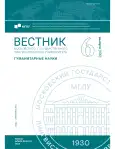The Phenomenon of Euphemisation in Modern German-Language Media (based on the news on Tagesschau)
- Authors: Gujejiani T.A.1
-
Affiliations:
- Moscow State Linguistic University
- Issue: No 6(900) (2025)
- Pages: 33-40
- Section: Linguistics
- URL: https://bakhtiniada.ru/2542-2197/article/view/301076
- ID: 301076
Cite item
Abstract
This article aims to determine the ways of expressing the phenomenon of euphemisation in modern German news. The main research method is contextual analysis, the material is the texts of the Tagesschau. Examples from German-language media demonstrate the functioning of euphemization means, which allows us to assess their role in shaping public opinion and adapting language to modern socio-cultural realities. As a result of the study, the main lexical and grammatical means of euphemization in German-language media texts were identified.
About the authors
Tamara Anzorovna Gujejiani
Moscow State Linguistic University
Author for correspondence.
Email: tamara20051999@gmail.com
Lecturer, Department of Grammar and History of the German Language, Faculty for the German Language
Russian FederationReferences
- Dobrosklonskaya, T. G., Zhang, H. (2015). Media linguistics in Russia and abroad: achievements and prospects. Bulletin of Moscow University. Series 19. Linguistics and intercultural communication, 1, 9–19. (In Russ.)
- Guseinova, I. A., Gorozhanov, A. I. (2023). Connotated image as a way of constructing informational opposition in the fictional and publicistic genre. J. Sib. Fed. Univ. Humanit. soc. sci., 16(6), 911–920. EDN HZMXIN. (In Russ.)
- Ter-Minasova, S. G. (2000). Jazyk i mezhkul'turnaja kommunikacija = Language and intercultural communication: textbook. Moscow: Slovo. (In Russ.)
- Kuznetsova, N. V. (2017). Fenomen politkorrektnosti v sovremennom politicheskom diskurse = Phenomenon of political correctness in modern political discourse: abstract of PhD thesis in Philology. Buryat State University. (In Russ.)
- Luchtenberg, S. (1985). Euphemismen im heutigen Deutsch: mit einem Beitrag zu Deutsch als Fremdsprache. Frankfurt am Main: Peter Lang.
- Sibul, V. V., Kuksova, A. V. (2021). Communication during coronavirus: functioning of euphemisms in media coverage. Issues of applied linguistics, 41, 47–65. doi: 10.25076/vpl.41.03.
- Porokhnitskaya, L. V., Biryukova, I. A. (2022). Evfemiya v sinkhronii i diakhronii = Euphemism in synchrony and diachrony. Moscow: Sputnik+. (In Russ.)
- Mironina, A. Y., Porchesku, G. V. (2023). Euphemism as a linguistic strategy of evasion in political media discourse. Research Result. Theoretical and Applied Linguistics, 9(2), 4–18. doi: 10.18413/2313-8912-2023-9-2-0-1.
- Guseynova, I. A., Gorozhanov, A. I. (2024). Un-Words as a Factor of Ideologization in the Modern German Political Discourse. Science Journal of Volgograd State University. Linguistics, 23(4), 84–95. doi: 10.15688/jvolsu2.2024.4.7. EDN XMNCZX.
- Dobrosklonskaya, T. G. (2020). Medialinguistics: Theory, Methods, Directions: Monograph. Moscow: KDU, Dobrosvet. (In Russ.)
- Olyanich, A. V. (2004). Prezentacionnaja teorija diskursa = Presentational theory of discourse. Volgograd: Paradigm. (In Russ.)
- Busygina, M. V., Zheltuhina, M. R. (2016). Mediazhanr "press-reliz" = The media genre ‘press release’: a textbook. Volgograd: PrinTerra-Dizajn. (In Russ.)
- Salakhunov, A. A. (2024). How expressive means of language influence the perception of news in the media. Science Bulletin, 4–9(78), 281–285. (In Russ.)
- Ol'shanskij, I. G., Guseva, A. E. (2005). Leksikologija: Sovremennyj nemeckij jazyk = Lexicology: Modern German: textbook. Moscow: Academy, 2005.
- Budagov, R. A. (2003). Introduction to the Science of Language. Moscow: Dobrosvet-2000. (In Russ.)
- Grishaeva, L. I. (2023). Euphemization as a cause and consequence of the variability of the ratio in the communication of objectified and co-activated information about the world. Vestnik MGPU. Seriya: Filologiya. Teoriya yazyka. Yazykovoe obrazovanie, 4(52), 47–72. doi: 10.25688/2076-913X.2023.52.4.05. (In Russ.)
- Popova, K. V. (2014). Translation of euphemisms in the media. In Actual issues of philological science of the 21st century (pp. 218–221): collection of articles. IV Int. scientific conf. of young scientists, dedicated to the 80th anniversary of the Department of Foreign Languages (2014, February 7). Ekaterinburg: UrFU. (In Russ.)
Supplementary files










